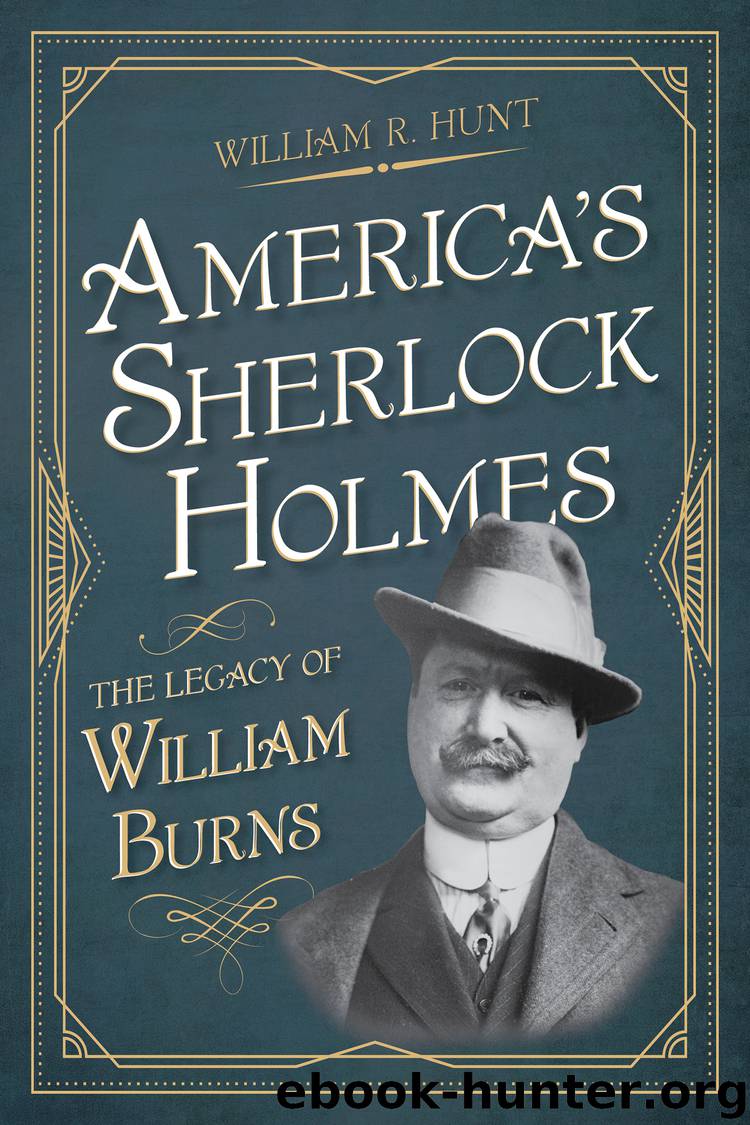America's Sherlock Holmes by William R. Hunt

Author:William R. Hunt [Hunt, William R.]
Language: eng
Format: epub
Publisher: Lyons Press
Published: 2019-01-01T16:00:00+00:00
Chapter Nine
Agents Provocateurs
Burns now began to picture himself as a shield of capital.
Edward Levinson
“William J. Burns had proved himself to the men he called sons of bitches,” observed Lincoln Steffens, “so that when he organized a national detective bureau they joined it as subscribers.” Certainly Burns had proved to corporation directors that he was a very efficient detective, but he also demonstrated that he was sound and trustworthy in his social attitudes. He would be a safe, reliable protector of their interests and he was available. He identified himself and declared his willingness somewhat romantically at times: “My name is William J. Burns, and my address is New York, London, Paris, Montreal, Chicago, San Francisco, Los Angeles, Seattle, New Orleans, Boston, Philadelphia, Cleveland, and wherever else a law-abiding citizen may find need of men who know how to go quietly about throwing out of ambush a hidden assassin or drawing from cover criminals who prey upon those who walk straight,” he wrote in The Masked War.
The place of the detective in American labor disputes had a long tradition before Burns entered the field. James McParland had become a national hero in the 1870s because of his undercover penetration of the Molly McGuires. Allan Pinkerton, McParland’s employer, celebrated his agent’s exploits and warned the nation of dangerous strikers in a book entitled Strikers, Communists, Tramps and Detectives, published in 1878. Of the foursome named in the title only the detectives were good, honest men. Pinkerton was very proud of his stern course in breaking the great industrial strikes of 1877, the first battles of fledgling unions to show their muscle against their employers. Of course, the “Communists” Pinkerton discussed were not yet those who roused Burns and many other American leaders to such paranoid frenzy after the Russian Revolution, but they were as bad for the nation as Pinkerton could imagine any enemies to be. He, in the 1870s, just as with Burns in 1913 and subsequently, wished to save America from nasty communist types and expose “the inner workings of the most important of those labor organizations which invariably results in disaster to their members and ruin to themselves.”Allan Pinkerton claimed to be sympathetic to the working man because he had once been one of them himself. He recalled suffering under harsh bosses, sometimes working very hard for a paltry wage, and sometimes finding no work. Thus, he felt justified in advising workers that the trade unions of the day “are a relic of the old despotic days. The necessities for their existence, if they ever existed, had passed away. In America citizenship there exists all the essentials to make a success in the life of every man not only possible, but probable.” So unions, which exist for “the concentration of brute force” lay themselves open for the infiltration of communists who embitter working men against employers “and gradually make him an enemy of all law, order, and good society.” These were terrible results and so unnecessary when a worker’s sole aim would otherwise be “to improve himself .
Download
This site does not store any files on its server. We only index and link to content provided by other sites. Please contact the content providers to delete copyright contents if any and email us, we'll remove relevant links or contents immediately.
| Africa | Asia |
| Canadian | Europe |
| Holocaust | Latin America |
| Middle East | United States |
Fanny Burney by Claire Harman(26582)
Empire of the Sikhs by Patwant Singh(23059)
Out of India by Michael Foss(16837)
Leonardo da Vinci by Walter Isaacson(13292)
Small Great Things by Jodi Picoult(7100)
The Six Wives Of Henry VIII (WOMEN IN HISTORY) by Fraser Antonia(5486)
The Wind in My Hair by Masih Alinejad(5070)
A Higher Loyalty: Truth, Lies, and Leadership by James Comey(4937)
The Crown by Robert Lacey(4791)
The Lonely City by Olivia Laing(4787)
Millionaire: The Philanderer, Gambler, and Duelist Who Invented Modern Finance by Janet Gleeson(4447)
The Iron Duke by The Iron Duke(4337)
Papillon (English) by Henri Charrière(4238)
Sticky Fingers by Joe Hagan(4172)
Joan of Arc by Mary Gordon(4080)
Alive: The Story of the Andes Survivors by Piers Paul Read(4009)
Stalin by Stephen Kotkin(3940)
Aleister Crowley: The Biography by Tobias Churton(3622)
Ants Among Elephants by Sujatha Gidla(3450)
